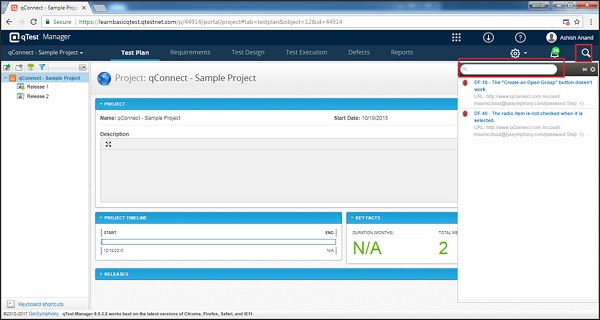
- qTest - Home
- qTest - Introduction
- qTest - Features
- qTest - Free Trial Access
- qTest - Login
- qTest - Dashboard
- qTest - Invite Users
- qTest - Add a Project
- Test Plan & Release Management
- Test Plan & Build Management
- qTest - Modules Management
- qTest - Requirements
- qTest - Create Associated Test Cases
- qTest - Import Requirements
- qTest - Export Requirements
- qTest - Export RTM
- qTest - Test Design
- qTest - Calling a Test Case
- qTest - Approve a Test Case
- qTest - Import Test Cases
- qTest - Export Test Cases
- qTest - Test Cycle Management
- qTest - Test Suite Management
- qTest - Add Test Runs
- qTest - Test Execution
- qTest - Quick Run
- qTest - Submit a Defect
- qTest - Clone a Defect
- qTest - Import a Defect
- qTest - Reports
- qTest - Filter
- qTest - Drag & Drop
- qTest - Hotkeys
- qTest - Recycle Bin
- qTest - Search
- qTest - Toggle ID
- qTest - Tagging ID
qTest - Search
You can quickly search a system object such as requirement, test case, test run, or defect. You can also search for partial information that belongs to a system object such as a description or a comment by entering the keywords into the Search box located on the top right corner of any page.
The following screenshot displays the location of the Search box.

qTest also supports free text search and syntax search.
Free-text Search
The system searches for free-text, which you key in and then returns all the objects that have free-text. Apart from that, the following set of pre-defined functions can be used to find an object −
Release − ID, Name, Status, Description, Release Note
Build − ID, Name, Status, Build Note
Requirement − ID, Name, Status, Description, Type, Comment
Test Case − ID, Name, Description, Status, Type, Test Step Description, Test Step Expected Result, Comment
Test Suite − ID, Name, Description, Execution Type
Defect − ID, Summary, Description, Status, Type, Comment
Test Run − ID, Name, Status, Execution Type, Test Step Description, Test Step Expected Result, Test Step Actual Result
Syntax Search
Syntax search helps to narrow down the searched result or find unique objects, based on the following details.
Search by IDs
Each qTest object is associated with an ID (a prefix and followed by an ID number). It helps to refer to unique objects as well as search them quickly. Following syntax can be used to find an object using id.
id:id_number − This syntax returns the object which has the specified ID number. For example: id:50 will return all objects having ID numbers as 50, such as requirement RQ-50, defect DF-50, test case TC-50, etc.
id:prefixid_number − This works the same way as obj: object_typeid:id_number. To find a unique object, you can define with the object prefixes (RQ, TC, DF, etc.). This syntax will return a unique object of the specified type and the ID number. For example, id:tc-50 or obj:tc id:50 will return the test case TC-50.
Combine Different Keywords
You can narrow down the search results by using a more advanced syntax search, such as obj:object_typeobject_field: free text AND/OR ( ) obj:object_typeobject_field: free text. Following table lists down the keywords that can be used to make advanced syntax search.
| Objects | Object_type search keys | Object_field | Object_field search keys |
|---|---|---|---|
| Release | rls | Name | name |
| Status | stat | ||
| Description | des | ||
| Release note | note | ||
| Build | bld | Name | name |
| Status | stat | ||
| Build note | note | ||
| Test Case | tc | Name | name |
| Description | des | ||
| Status | stat | ||
| Type | type | ||
| Comment | cmt | ||
| Test Step Description | tsdes | ||
| Test Step Expected Result | tsexp | ||
| Requirement | req | Name | name |
| Description | des | ||
| Status | stat | ||
| Priority | prt | ||
| Type | type | ||
| Comment | cmt | ||
| Test Suite | ts | Name | name |
| Description | des | ||
| Execution type | type | ||
| Test Run | tr | Name | name |
| Status | stat | ||
| Execution Type | type | ||
| Test Step Description | tsdes | ||
| Test Step Expected Result | tsexp | ||
| Test Step Actual Result | tsact | ||
| Defect | df | Summary | sum |
| Description | des | ||
| Severity | svt | ||
| priority | prt | ||
| Status | stat | ||
| Type | type | ||
| Comment | cmt |